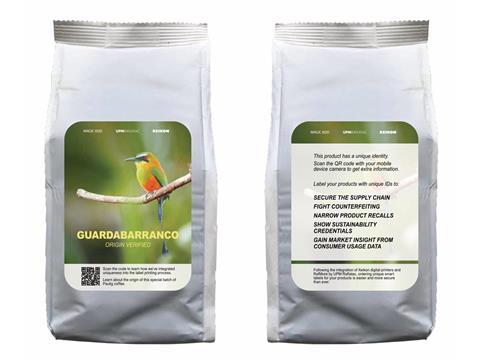
UPM Raflatac's intelligent label solution, RafMore by UPM Raflatac, is now available faster and more securely than ever thanks to an integration between Xeikon's digital printing presses and Magic Add's Internet of Packaging platform.
Magic Add’s IoP platform, which powers UPM Raflatac’s RafMore smart labels, can now send unique IDs to Xeikon digital printers directly from the cloud. Xeikon can automatically and securely print RafMore smart labels with unique digital identities in the form of any standard, machine-readable code with shorter turnarounds and in greater quantities than ever possible before.
“Even if you need several million labels, you can just choose to add unique IDs to them during the normal printing process. Integrating Magic Add’s unique ID generation into Xeikon’s X-800 work flow enables new applications and reduces the time because there’s no need for manual integration,” says Jeroen Van Bauwel, Director of Product Management at Xeikon.
“This makes smart packaging much faster and easier for brand owners, especially if they want to try smart labels for the first time,” says Ari Salonen, CEO of Magic Add.
UPM Raflatac’s RafMore smart labels can be used to track product origin, authenticate products and fight counterfeiting, make product recalls as narrow as possible, show consumers sustainability credentials, and more. In return for offering users more product information and supply chain transparency, brands gain valuable market insight data based on real-time consumer usage.
Xeikon unveiled the new integration last week at Labelexpo Europe 2019 in Brussels. In addition to showcasing the digitally printed smart labels, its demo provided a real-world example of the power of smart packaging. The demos contained samples of fully origin-tracked coffee from a pilot conducted by Magic Add, UPM Raflatac, Paulig, coffee partner Volcafe, and farmer outreach programme Volcafe Way.
Using RafMore smart labels, Paulig’s coffee was tracked starting at the point of harvest in Guatemala, through roasting and packaging. In the pilot, the data flow was tested from the country of origin, where the coffee was grown and harvested sustainably and all through the supply chain. “This is a holistic demo of both the value of smart packaging and how brands could introduce it to their products to increase transparency for consumers,” says Sami Poukka, vice-president for Global Business and Segment Development at UPM Raflatac.












